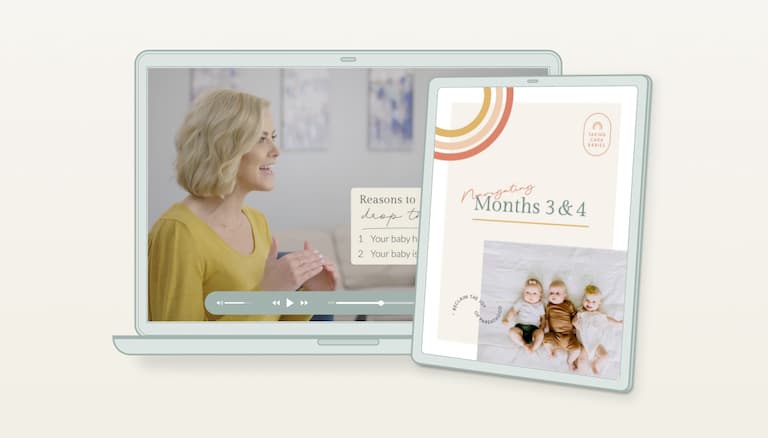Are you a new or expecting mom with questions about breastfeeding? You’re in the right place. Let me give you breastfeeding tips, talk about nursing positions, and share reasons why breastfeeding and nursing can feel so hard (and how to help).
Breastfeeding 101 for Beginners anchor
As a former Labor and Delivery/Postpartum Nurse and a mom who nursed her own babies, I know first-hand that breastfeeding can feel overwhelming, especially in the beginning! In those first few days and weeks, there seems to be so much to remember. I want to show you “The Breastfeeding Basics as Taught by a Subway Sandwich.” My goal is to give you a way to think about those basic rules, so it doesn’t feel quite so overwhelming (and hopefully make you laugh too!).
Expert Tip: Even if you’ve been nursing for months or if you’ve already nursed a baby before, these tips can be helpful!
My Top Breastfeeding Tips:anchor
Remove those extra blankets and clothing. Being skin-to-skin with mom prepares your baby for a good feeding.
Your baby’s belly button should face your belly button during a feeding. Double-check to make sure their belly is not facing the ceiling.
Make a “C” or a “U” with your hand to help fit the entire areola into your baby’s mouth. No “scissor-fingers.”
Wait for your baby to have a big open mouth, and then get the entire nipple to the back of the tongue. A latch at the tip can cause some major pain.
Bring your baby to the breast instead of stretching your breast to the baby.
If your little one is falling asleep- wake that baby! Our goal is an engaged eater so that you can get a full feeding instead of just a snack.
Be responsive to your baby’s hunger cues instead of keeping a strict schedule.
Continuous pain is not normal, it means the latch needs attention. Seek out the help of a lactation specialist!
Take a breastfeeding class or reach out for an appointment with a lactation consultant.
Watch the Taking Cara Babies newborn class. I’ll show you how to calm a fussy baby, read sleepy cues, work towards longer stretches of sleep at night (even while breastfeeding), and love the newborn stage.
A note from my heart: Keep in mind that your baby doesn’t know what they are doing either. You are learning as you go, TOGETHER! You are the best mama on the planet for this baby!
Breastfeeding Positionsanchor
There are many different breastfeeding positions. You may find that one works best for you and your baby, or that you prefer mixing it up from one feeding to the next. Here are the most common breastfeeding positions for newborns:
Cross-Cradle Hold. While sitting upright with a supportive pillow on your lap, bring your baby across your body with the arm of the non-nursing side; this hand will support your baby’s neck while the arm will support their body. Use the hand on the nursing side to support your breast from underneath, using the U-hold. Your baby’s belly should be touching your belly. Bring your baby to your breast. This position is ideal for young newborns while learning to properly latch.
Football Hold. Place a pillow or support to one side of your body while you are seated. Place your baby on top of the support, with their head near your breast. Your baby’s belly will be pointed up in this position. You will support their neck with your hand and will bring the baby to the breast. This position is ideal for smaller newborns or mothers who have had a c-section. The football hold can also be used for twins, with one baby on each side.
Cradle Hold. While sitting upright with a supportive pillow on your lap, you will support your baby’s head and body with the arm on the nursing side. Your baby’s head will cradle into your elbow while your arm will support their body. Your baby’s belly should be touching your belly in this position. You can use your free arm to support underneath your breast to help with a proper latch. This position is great for babies who are latching well or as they get bigger and need less head support.
Side Lying Nursing. While you lay on one side, position your baby to lay directly in front of you with their nose in line with your nipple. Your baby’s belly should be facing you. You can use one hand to support the nursing breast if needed. It is important that you remain fully awake in this position and return your baby to a safe sleeping space should they fall asleep.
Want tips to help set your mind at ease about baby sleep before your little one arrives?
I have a free download called 5 Things Every Expectant Parent Needs to Know about Baby Sleep.
How do I know if my newborn is hungry?anchor
Here are some of the most common newborn hunger cues:
![Newborn Hunger Cues: trying to fit fist in mouth, smacking lips, rooting around looking for a food source, crying and inconsolable, opening and closing mouth, shaking head from side to side [Taking Cara Babies]](https://cdn.takingcarababies.com/containers/assets/newborn-hunger-cues.png/20f9b4e3f5bf9da5a687f187c45a912e.png)
Most newborns will be hungry and ready for a full feeding every 2-3 hours during the day. However, watching for hunger cues is vital to setting up a flexible routine and being responsive to your baby's needs.
How do I know if my newborn is full after a feeding? anchor
Look for these signs that your baby is full:
Their hands are relaxed and open instead of curled into fists.
If you lift up your baby’s arm, it drops heavily instead of your newborn pulling it back towards their body.
Your baby is content at the end of a feeding and able to go 2-3 hours before the next feeding.
Please know that you might not see all of these each time.
If you have a newborn and are wondering how to set up your day, I can help. My First Five Months Bundle will show you how to create a flexible routine that is responsive to your baby’s needs and cues. I want you to have the tools and confidence to love this stage with your baby.
How long should a breastfeeding session last for a newborn?anchor
In those early weeks and months, it’s typical for a newborn to feed at the breast for a full 20-40 minutes. As your baby gets bigger and stronger, they become more efficient eaters and may only take 10-15 minutes for a full feeding!
Expert Tip: If your newborn is consistently taking 45 minutes or longer for a feeding, it can be helpful to have the guidance of a lactation specialist. They can observe your baby’s latch and feeding behaviors to ensure your little one is feeding efficiently.
How do I keep my newborn awake during breastfeeding?anchor
Newborns can be sleepy while eating! But, getting full feedings is really important. If your baby starts to doze off while nursing, here are some great strategies to try:
Start with a diaper change to help your baby wake up a bit. You might also add in a diaper change halfway through the feeding.
Undress your baby (with only a diaper on them) and let them be skin-to-skin during feeding. Skin-to-skin contact encourages sucking and helps keep your baby awake while feeding.
Keep the lights on while feeding. Open up those curtains to let the daylight shine in!
Try rubbing a damp cloth on your baby’s face and chest.
Take a quick break and lay your baby down in the middle of the floor. Sometimes just being away from your warm body will wake them up a bit.
Offer a feeding at the beginning of a wake window if possible.
If your baby is often falling asleep during their bedtime feeding, try shifting the feeding earlier in the bedtime routine.
Ensure that your baby has a proper latch.
Try breast compressions. This means you’ll gently massage your breast towards your baby’s mouth, which helps encourage sucking and swallowing.

First Five Months Bundle
stars ( reviews)
If it feels impossible to keep your newborn awake during a feeding or if feeding to sleep is the only way to get your little one to sleep, my First Five Months Bundle can help. I’ll teach you developmentally appropriate tools to help your baby fall asleep more independently, get those important full feedings, and help you all get the rest you need to thrive.
Learn MoreDo you burp a newborn after breastfeeding? anchor
Yes! Whether your newborn is breast or bottle fed, it’s helpful to burp them both halfway through a feeding and after the feeding is finished. This helps get rid of excess gas in their tummies to keep them as comfortable as possible. Keep in mind that not all breastfed babies will burp every time you try. Attempt to burp for a few minutes, and then continue on with your feeding or wake window.
Can you overfeed a newborn while breastfeeding?anchor
Rest assured that it’s extremely difficult to overfeed a breastfed baby! When a baby is satisfied and finished eating, they will often turn their head away from the breast, fall asleep, or simply refuse to latch.
If you’re concerned that your baby may be overfeeding while nursing, please reach out to your pediatrician or lactation specialist.
Why is breastfeeding so hard?anchor
I hear new moms doubt themselves and their abilities when breastfeeding doesn’t feel like “the most natural thing in the world.” I want to reassure you: You’re not alone if you feel like breastfeeding is a challenge. Nursing and breastfeeding can be complicated. Even if you’ve nursed before, each baby brings unique considerations. What worked for one baby might be different for the next. Finding what works best for you and your baby while navigating hormones after pregnancy can be a delicate balance. Please know that no matter how easy or difficult breastfeeding is for you— or if you decide not to breastfeed altogether— you are the best mama on the planet for that baby. You are meant to be their mama. You’re the right one for this job.
If you’re having pain with nursing, struggling with supply, or needing support, I want to encourage you to reach out to a lactation specialist and consider joining a breastfeeding support group.
Is it OK not to breastfeed? anchor
Absolutely. The best way to feed your baby is the way that works best for your family. That may mean you decide to exclusively breastfeed, exclusively pump and feed with a bottle, give your baby formula, or feed your baby with a combination of those.
I want to remind you that your worth and skill as a mom are not tied to how you choose to feed your baby. You are the best mama on the planet for that baby. No one could do it better.
Breastfeeding FAQ:anchor
-
Yes! If you’re breastfeeding, you can still offer your baby a pacifier.
If you’re concerned about the potential of nipple confusion with pacifier use, I have good news for you! Research shows us that nursing moms who introduce a pacifier are just as successful with nursing as those who don’t. True scientific research dispels the myth of nipple confusion and shows that limiting pacifiers does not increase nursing success.
-
A breastfeeding pillow is not a necessity, but you may find it helpful in those early weeks. When your newborn is still really small, having the support of a pillow will help ensure that your little one is in a great position to latch properly and comfortably.
You don’t have to go out and buy a fancy breastfeeding pillow. You can simply use supportive bed or couch pillows that you have at home. If you want one specific to breastfeeding, here is one of my favorites!
-
Although in those early days there may tenderness with an initial latch, breastfeeding should not be painful. There may also be some discomfort with let-down.
If you are experiencing pain while breastfeeding, this is a sign that your baby’s latch needs adjusting. Your lactation specialist will be able to observe a feeding and help make necessary adjustments so that both mom and baby are comfortable while breastfeeding.
-
Having a great support system postpartum and while breastfeeding can truly be a game changer. Places you can find support are:
-
Local hospital. Many hospitals host new mom and breastfeeding support groups.
-
Lactation Specialist. You will likely meet an IBCLC in the hospital after your baby is born, but having a specialist for follow-up support will be so helpful for any troubleshooting along the way.
-
WIC. Women, Infant, and Children Breastfeeding Support has many online resources and helpful information for breastfeeding mothers.
-
National Women’s Health and Breastfeeding Helpline has peer counselors available to answer the phone and provide free support.
-
Pediatrician’s office. If you are unsure of support services in your area, your pediatrician will be a great resource.
-












